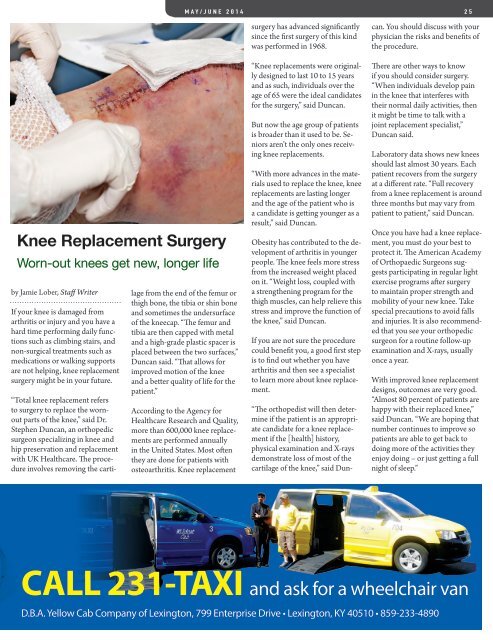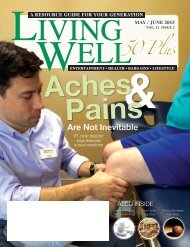Living Well 60+ May-June 2014
Create successful ePaper yourself
Turn your PDF publications into a flip-book with our unique Google optimized e-Paper software.
MAY/JUNE 2 0 1 4<br />
Knee Replacement Surgery<br />
Worn-out knees get new, longer life<br />
by Jamie Lober, Staff Writer<br />
If your knee is damaged from<br />
arthritis or injury and you have a<br />
hard time performing daily functions<br />
such as climbing stairs, and<br />
non-surgical treatments such as<br />
medications or walking supports<br />
are not helping, knee replacement<br />
surgery might be in your future.<br />
“Total knee replacement refers<br />
to surgery to replace the wornout<br />
parts of the knee,” said Dr.<br />
Stephen Duncan, an orthopedic<br />
surgeon specializing in knee and<br />
hip preservation and replacement<br />
with UK Healthcare. The procedure<br />
involves removing the cartilage<br />
from the end of the femur or<br />
thigh bone, the tibia or shin bone<br />
and sometimes the undersurface<br />
of the kneecap. “The femur and<br />
tibia are then capped with metal<br />
and a high-grade plastic spacer is<br />
placed between the two surfaces,”<br />
Duncan said. “That allows for<br />
improved motion of the knee<br />
and a better quality of life for the<br />
patient.”<br />
According to the Agency for<br />
Healthcare Research and Quality,<br />
more than 600,000 knee replacements<br />
are performed annually<br />
in the United States. Most often<br />
they are done for patients with<br />
osteoarthritis. Knee replacement<br />
surgery has advanced significantly<br />
since the first surgery of this kind<br />
was performed in 1968.<br />
“Knee replacements were originally<br />
designed to last 10 to 15 years<br />
and as such, individuals over the<br />
age of 65 were the ideal candidates<br />
for the surgery,” said Duncan.<br />
But now the age group of patients<br />
is broader than it used to be. Seniors<br />
aren’t the only ones receiving<br />
knee replacements.<br />
“With more advances in the materials<br />
used to replace the knee, knee<br />
replacements are lasting longer<br />
and the age of the patient who is<br />
a candidate is getting younger as a<br />
result,” said Duncan.<br />
Obesity has contributed to the development<br />
of arthritis in younger<br />
people. The knee feels more stress<br />
from the increased weight placed<br />
on it. “Weight loss, coupled with<br />
a strengthening program for the<br />
thigh muscles, can help relieve this<br />
stress and improve the function of<br />
the knee,” said Duncan.<br />
If you are not sure the procedure<br />
could benefit you, a good first step<br />
is to find out whether you have<br />
arthritis and then see a specialist<br />
to learn more about knee replacement.<br />
2 5<br />
“The orthopedist will then determine<br />
if the patient is an appropriate<br />
candidate for a knee replacement<br />
if the [health] history,<br />
physical examination and X-rays<br />
demonstrate loss of most of the<br />
cartilage of the knee,” said Duncan.<br />
You should discuss with your<br />
physician the risks and benefits of<br />
the procedure.<br />
There are other ways to know<br />
if you should consider surgery.<br />
“When individuals develop pain<br />
in the knee that interferes with<br />
their normal daily activities, then<br />
it might be time to talk with a<br />
joint replacement specialist,”<br />
Duncan said.<br />
Laboratory data shows new knees<br />
should last almost 30 years. Each<br />
patient recovers from the surgery<br />
at a different rate. “Full recovery<br />
from a knee replacement is around<br />
three months but may vary from<br />
patient to patient,” said Duncan.<br />
Once you have had a knee replacement,<br />
you must do your best to<br />
protect it. The American Academy<br />
of Orthopaedic Surgeons suggests<br />
participating in regular light<br />
exercise programs after surgery<br />
to maintain proper strength and<br />
mobility of your new knee. Take<br />
special precautions to avoid falls<br />
and injuries. It is also recommended<br />
that you see your orthopedic<br />
surgeon for a routine follow-up<br />
examination and X-rays, usually<br />
once a year.<br />
With improved knee replacement<br />
designs, outcomes are very good.<br />
“Almost 80 percent of patients are<br />
happy with their replaced knee,”<br />
said Duncan. “We are hoping that<br />
number continues to improve so<br />
patients are able to get back to<br />
doing more of the activities they<br />
enjoy doing – or just getting a full<br />
night of sleep.”<br />
CALL 231-TAXI and ask for a wheelchair van<br />
D.B.A. Yellow Cab Company of Lexington, 799 Enterprise Drive • Lexington, KY 40510 • 859-233-4890
















